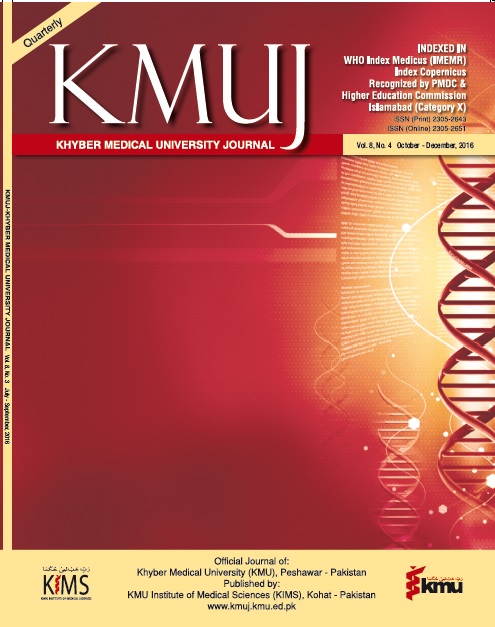GROSS PYURIC DIABETICS WITH UNCONTROLLED GLYCEMIA: PATTERN OF PATHOGENIC ORGANISMS AND ANTIMICROBIAL SUSCEPTIBILITY
Main Article Content
Abstract
Abstract
Objectives: To determine the frequency of microbiologically confirmed UTI, pattern of causative organisms and their antimicrobial susceptibility in uncontrolled diabetic patients with gross pyuria in our set up
Methodology: This study was conducted at Department of Medicine , Teaching Divisional Headquarter Hospital KDA Kohat and Qazi Medical centre, Kohat, Pakistan during the period January 2015 to December 2015. Ninty six adult diabetic patients (type I and type II) having uncontrolled glycemia (BRS>200mg/dl) with gross pyuria (>100 pus cell/HPF on urinalysis) and not taking any antibiotic for last 3 days were selected for the study.Urine of selected patients was sent for culture and sensitivity. Those culture reports were considered positive who had colony forming units of 105/ml of urine. Data was collected prospectively on structured proforma .
Results: Out of 96 tested urine samples 80 (85%) were with positive urine culture report while in 16(15%) cases no significant growth of any microorganism (sterile pyuria) was obtained so overall frequency of microbiologically confirmed UTI was 85%. Out of these 80 positive cases, E.Coli was seen in 68(85%) samples. Isolated E.Coli showed 100% sensitivity to Piperacillin plus tazobactum and imipinem but 100% resistance was observed to naladixic acid, norfloxacin, , ciprofloxacin and moxifloxacin.
Conclusion: Escherichia coli was found to be the most predominant isolate, Showing very high drug resistance particularly to naladixic acid, ciprofloxacin and norfloxacin. Well-designed studies are required to study antimicrobial resistance pattern to urothogens in large diabetic population in order to guarantee suitable recommendations for the treatment UTI in diabetics.
Key words: Urinary tract infection, diabetes mellitus, culture pattern, antibiotic sensitivity
Article Details
Work published in KMUJ is licensed under a
Creative Commons Attribution 4.0 License
Authors are permitted and encouraged to post their work online (e.g., in institutional repositories or on their website) prior to and during the submission process, as it can lead to productive exchanges, as well as earlier and greater citation of published work.
(e.g., in institutional repositories or on their website) prior to and during the submission process, as it can lead to productive exchanges, as well as earlier and greater citation of published work.
